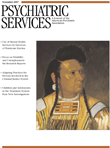Psychiatrists and Religious Belief
To the Editor: Research has indicated that religion can be a significant source of support for some recipients of mental health services, although they typically have less access to religious resources (
1,
2,
3 ). In their article in the September issue, Curlin and colleagues noted that psychiatrists are less likely than other physicians to be religious, which raises questions about whether they can accurately assess the importance of religion in their patients' lives. In light of our findings (presented below), psychiatrists need to keep in mind that some patients may need particular support in this area if they are to successfully join and remain part of faith communities.
We examined impediments to participation in faith communities by interviewing three groups of patients (N=40 each): patients with chronic psychiatric illness, patients with acute psychiatric illness, and a control group of medical-surgical patients. Participants in the control group were matched with participants in the chronic group on gender, race-ethnicity, and age. To partially control for socioeconomic status, all participants in the control group were recipients of Medicaid benefits or Medicare and Medicaid benefits. Participants in the chronic group were inpatients at a state psychiatric hospital in upstate New York. The acute care participants and the medical-surgical participants were patients at a large tertiary care hospital adjacent to the psychiatric hospital. Interviews were done in 1998.
Of the 120 participants, 66 (55%) were male, and 54 (45%) were female. A total of 79 patients (66%) were European American, 35 (29%) were African American, four (3%) were Hispanic, and two (2%) were in the "other" category. Forty-seven participants (39%) reported being Protestant, 41 (34%) were Roman Catholic, four (3%) were Jewish, three (3%) were Muslim, and 15 (13%) were in the "other" category. The individual interviews included open-ended questions, questions on specific impediments to participation in faith communities, and the Duke University Religion Index (
4 ).
A one-way analysis of variance found no statistically significant differences in impediments among the groups, but the order of impediments differed. The most frequently endorsed item in the acute psychiatric and medical-surgical groups was lack of transportation, whereas for patients with chronic illness the most frequently endorsed item was "past experiences of being made to feel unwelcome." Other items endorsed by participants included not having the proper clothing to wear, fear of being made to feel unwelcome, not having money to put in the offering, being uncomfortable with groups of people, inconvenient time of the worship service, and difficulty sitting through the service.
Each of the 84 participants (70%) for whom faith was important reported that one or more of the impediments made it difficult to participate in a religious community at least some of the time. Thus it appears that being sick and poor makes it difficult to remain connected to a faith community. Recipients of mental health services, as well as people with low incomes who have chronic medical problems, may need assistance from caregivers if they are to be part of faith communities.

